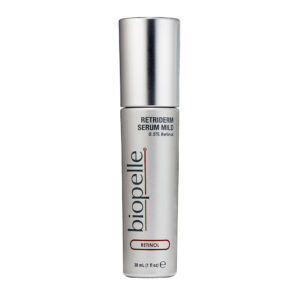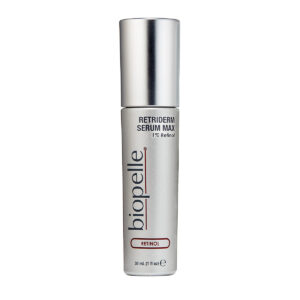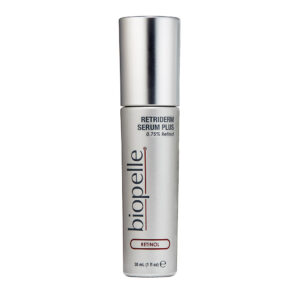Have you heard of retinol? Rumor has it this multi-benefit ingredient can fix your skin, maybe do your laundry as well. Retinol is a skincare powerhouse that many dermatologists and skincare professionals recommend for a wide range of anti-aging benefits and even acne. Let’s talk about retinol. What is retinol and how can you introduce it into your daily routine.
What is Retinol Skincare?
Retinol is a kind of catch-all phrase applied to topical applications of retinoids, derivatives of vitamin A that have powerful skincare benefits. Retinoids work by supporting collagen production and cellular turnover.
Some common retinoids include:
- Retinol
- Retinyl palmitate
- Tretinoin
- Tazarotene
- Adapelene
- Hydroxypinacolone Retinoate (HPR)
Some of these retinoids can be found over the counter, like adapelene, retinol and retinyl palmitate. Retinol is one of the strongest over-the-counter versions of retinoids and is common in many skincare routines because retinol can help:
- Prevent or reduce the appearance of wrinkles and fine lines
- Brighten dull skin
- Increase cell turnover
- Reduce acne
- Fade dark spots
Why Introduce Retinol Into Your Routine?
A common saying is that skin cells turn over every 28 days until you reach the time you’re 30 and then dramatically slows down. One of the major benefits of retinol is it increases the rate of cell turnover in your skin, leading to fresher, more youthful skin over time.
Retinol is often considered a staple in any anti-aging skincare regimen, as it can improve skin’s texture, tone, blemishes and fine lines. With continued use, retinol can result in visibly more youthful skin.
How To Use Retinol
Retinol has a good reputation when it comes to anti-aging skincare, but it’s not without downsides. Using the wrong strength of retinol or not properly caring for your skin when using retinol can cause irritation, dryness, flaking and redness.
Some tips for using retinol include:
- Do use the right strength. Retinols come in different strengths starting with 0.05% and going above 1% for prescription-strength products. Dermatologists recommend starting with a low percentage and moving up as your skin adjusts to the products.
- Don’t use too much. Depending on the formulation, typically a pea sized amount is all you need to cover your face. Retinol goes a long way with just a little. “Starting a new retinol with a lower frequency of application, such as every other or every third evening, may be necessary for those with sensitive skin, working up slowly to every night application over weeks,” said Austin dermatologist Dr. Ted Lain, M.D.
- Do be mindful of what other products you’re using. Vitamin C products used in the morning for antioxidant benefits in conjunction with a night-time retinol are a match made in heaven. Chemical peels should be used on days you aren’t applying retinol. Keep gentle products and moisturizers to use on days you’re applying retinol.
- Do apply at night OR make sure you’re well-stocked in SPF. Retinol can make your skin more susceptible to photodamage, especially right after application, which means it’s not recommended for AM use.
Can I Use Retinol in the Winter?
If your skin is already dry and flaking from harsh winters, you may wonder if you can add retinol into your routine. Lain says retinol can be used in winter, and, in fact, it’s one of the best times to start since you won’t have as much sun exposure.
“One should take care not to apply retinol to inflamed or irritated skin, therefore moisturizing plays a key role in the success of this important skincare product. Applying a moisturizing cream either prior to, or right after, a thin layer of retinol reduces the potential for these untoward side effects,” Lain said.
Is Retinol Irritating?
Retinol certainly can be irritating, but it doesn’t have to be. Lain said retinol skincare products like Biopelle’s Retriderm Serum line are an excellent choice for all skin types, including sensitive skin.
“The inclusion of water, humectants (hyaluronic acid, glycerin and solubilized collagen), and Vitamin E ensures a maintenance of excellent hydration and a decrease in inflammation. Linseed oil seals in this moisture while also contributing anti-inflammatory effects.”
Additionally, it goes back to starting slow. Lain said because Retriderm offers three strengths (.05% in Mild, .75% in Plus, and 1% in Max) you can start at a good level for your skin type and then work up as your skin adjusts.
“Those with fair and sensitive skin would want to start with the Mild formulation, whereas others with normal to oily skin complexions could more easily start at the Plus, or even Max formulations, along with moisturizers and sunscreens,” Lain said. “As with all retinol products, it is recommended that application be performed at night.”
How Soon Will I See Results With Retinol?
When using retinol it’s best to go low and slow over a sustained period of time to see the best results. Some dermatologists suggest you’ll see a marked improvement in skin tone and texture after about three months.
If you’re looking for a quick fix to your skincare concerns, be sure you aren’t irritating your skin by using too much retinol or not moisturizing properly. It’s important that you take proper care while using retinol, as inflammation may slow your results.

Best Selling Retinol Skincare Products
If you’re ready to introduce retinol into your routine, there’s no better place to start than with Biopelle’s Retriderm Serum line. Retriderm helps reduce the appearance of fine lines and wrinkles, and delivers firmer, smoother looking skin. It’s delivered in a protein-rich formula that helps increase absorption and reduce irritation. It comes in three strengths:
- Retriderm Serum Mild ($84) Ideal for beginners or sensitive skin, this nourishing serum allows you to introduce retinol into your routine with fewer side effects.
- Retriderm Serum Plus ($89.50) For those with oily skin or those ready to graduate to a higher level of retinol, this serum contains .75% retinol.
- Retriderm Serum Max ($94.50) For advanced retinol users ready for even more results, this 1% serum provides maximum retinol while still delivering the oil-free moisture to reduce inflammation.
Additionally, retinol is a key ingredient in these multi-tasking products that help provide a range of anti-aging benefits. These retinol skincare products include:
- Tensage Stem Cell Cream ($180) combines CellPro™ Technology and retinol to help naturally assist stem cell function, promote new healthy skin cells and reduce visible signs of aging.
- Tensage Stem Cell Eye Cream ($130) which contains CellPro™ Technology, caffeine and retinol to help replenish skin cells and combat multiple signs of aging specifically around the eyes.
- Emepelle Night Cream ($195) which is clinically proven to help address the signs of Estrogen Deficient Skin. This luxurious cream combines MEP Technology, retinol, niacinamide and peptides for power-packed anti-aging benefits for women in perimenopause and menopause.



